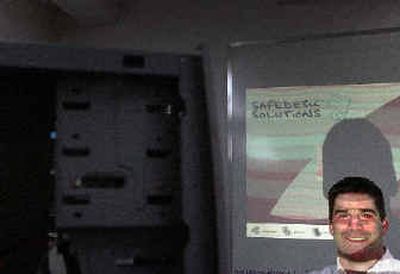Simple solution

The Linux revolution is alive and well, and Spokane-based SafeDesk Solutions is out there fanning the flames.
The small, 14-person company has been selling Linux-powered PC systems to school districts around the country. The company’s basic selling point is straightforward: Go Linux, dump Windows, and save money.
It has 18 customers, nearly all of them mid-sized or smaller school districts. None of those districts are in this area.
Company President Phil Autrey hopes to see sales of about $2.5 million this year. With the expectation of additional financing, Autrey hopes to add more staff to market the company’s products to commercial business customers.
Linux is an software operating system that’s an alternative to computers based on Microsoft Windows. It’s become a battle cry among software developers and technology managers who favor its simpler, cheaper operation.
The Linux option provided by SafeDesk is designed primarily to help cash-strapped districts save aging computers and provide effective technology for students at relatively less cost.
SafeDesk uses what the tech crowd calls a “thin-client” approach.
Most computers have a hard drive, memory and various software programs installed. As computers age, they need to be upgraded by adding more memory and tweaking performance. Additionally, programs like Windows or Microsoft Office require regular upgrades, not to mention anti-virus or spam filters.
A thin-client strips the user’s machine down to basics. SafeDesk sells a relatively inexpensive PC equipped with either 64 or 128 megabytes of memory. It has no hard drive, just a network card that runs the machine off a common server.
All the software is on the server, but the user’s machine operates, via the network, as if it all the software tools are right on the desktop.
Richard Nelson, the technology manager of the Mountain Grove (Missouri) School District, has become a thin-client champion.
About 100 of the district’s 700 computers have been converted to SafeDesk’s Linux system. Nelson said the SafeDesk option means the district can continue using older computers and can avoid major headaches and maintenance costs.
“It’s just about idiot-proof,” said Nelson.
The district’s technology staff spends 45 minutes to set up a typical student machine equipped with standard Microsoft software. It takes just five minutes to set up each SafeDesk PC, Nelson said.
Adding Linux doesn’t require replacing all the Windows machines. The Linux and Microsoft systems co-exist without any trouble, Nelson said.
Linux has the added benefit of essentially being virus-free.
“And if anyone changes settings or messes up the desktop, it only affects that one user,” Nelson said.
Nelson is now trying to persuade the school district’s administration to convert a large share of its remaining 600 machines to the SafeDesk option, Nelson said.
Buying one new Windows-based PC would run around $650. A SafeDesk PC runs something like $180, Nelson said. The SafeDesk server, however, runs around $7,800, said Nelson. And SafeDesk charges a yearly service fee of about 10 percent of the total cost of installing the hardware and software.
SafeDesk is a subsidiary of Autrey’s other Spokane business, Class 101, an educational-training company that he launched in Portland several years ago and moved to Spokane in 2001. SafeDesk evolved from a partnership Autrey formed with a Kansas City company called Lumen Software. Last year the two companies parted ways, with SafeDesk focusing on its own line of thin-client products.
Last year the company had triple-digit growth and Autrey expects to see the same level of growth in 2005.
One big goal is to see more sales to business customers. Senior Account Executive Mike Francisco said the plan is to find and work with companies that are looking for simpler technology choices.
“For example, banks that have tellers who just rely on accessing account records. Or call centers, where the same computer is used by two or three people per day. Those are the kinds of customers we’ll focus on first,” Francisco said.